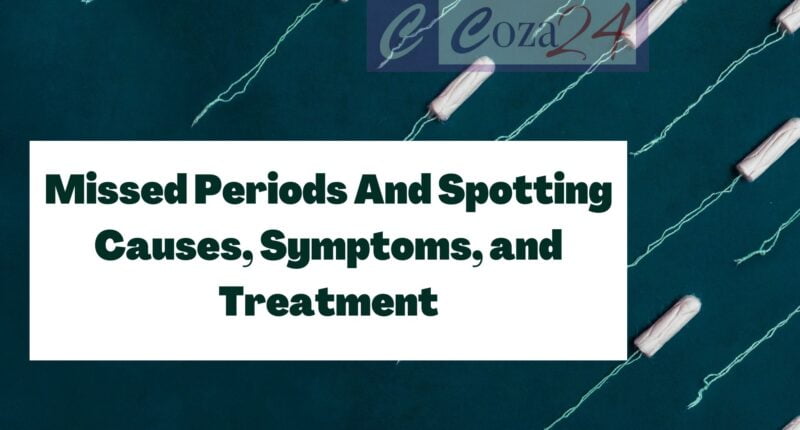Missed Periods And Spotting Causes – There are numerous causes of missed periods. Usually, there is no cause for concern. There is no need for concern if you miss one or two periods as long as you are certain you are not pregnant and feel good overall. You should see a doctor if you have any symptoms or have gone three to six months without getting your period. Teenage girls’ menstruation might occasionally begin later than usual. Contact your doctor if, by the time you are 16 (or 14 if other signs of development, such as pubic hair and breasts, have not begun), your periods have not begun.
If you’re experiencing any irregular bleeding, it’s important to get checked out. missed periods, or missed periods and spotting, can be a sign of something more serious like pregnancy or cancer. In this article, we’ll discuss the causes of missed periods, the symptoms to look for, and the best ways to treat missed periods if they are caused by something else.

Table of Contents
- 1 What Does It Mean If You Have Spotting Instead of Your Period?
- 1.1 1. Pregnancy
- 1.2 2. Birth control
- 1.3 3. Ovulation
- 1.4 4. Perimenopause
- 1.5 5. Cancer
- 1.6 6. Implantation bleeding
- 1.7 7. Trauma
- 1.8 8. Uterine or cervical polyps
- 1.9 9. Sexually transmitted infection
- 1.10 10. Pelvic inflammatory disease
- 1.11 11. Fibroids
- 1.12 12. Endometriosis
- 1.13 13. Polycystic ovary syndrome
- 1.14 14. Stress
- 1.15 15. Medications
- 1.16 16. Thyroid problems
- 2 Is it spotting or your period?
- 3 Should I take a pregnancy test?
- 4 When should I see a doctor?
- 5 Treatment
- 6 Causes of missed periods
- 7 Symptoms of a missed period
- 8 Treatment for missed periods
- 9 Final Note
What Does It Mean If You Have Spotting Instead of Your Period?
Spotting before your period is generally harmless. It may be an early sign of pregnancy or due to hormonal changes, implantation bleeding, polyps, or another health condition.
What is spotting?
Spotting is light vaginal bleeding that occurs outside of your regular period.
Spotting typically involves small amounts of blood. You may notice it in your underwear or on toilet paper after you’ve used the restroom. If you need protection, it usually only requires a panty liner — not a pad or tampon.
Bleeding any time other than when you have your period is considered abnormal vaginal bleeding, or intermenstrual bleeding.
Spotting has many causes. It can sometimes be a sign of a serious problem but not often. Keep reading to learn why you might be spotting between periods and when to see a doctor.
There are several reasons you may experience spotting before your period, including:
1. Pregnancy
Spotting during pregnancy is common. About 15 to 25 percent of pregnant people will experience spotting during their first trimester.
The bleeding is often light and may be:
- pink
- red
- brown
Spotting typically isn’t a cause for concern, but you should tell a doctor if you have it. Contact a doctor right away if you experience heavy bleeding or pelvic pain, as those could be a sign of miscarriage or an ectopic pregnancy.
2. Birth control
Spotting between periods can be caused by hormonal birth control:
- pills
- patches
- injections
- rings
- implants
Spotting can happen spontaneously or if you:
- start a hormone-based birth control method
- skip doses or take birth control pills not according to the package instructions
- change the birth control type or dose
- use birth control for a long time
Birth control is sometimes used to treat abnormal bleeding between periods. Talk with a doctor if your symptoms don’t improve or get worse. They may prescribe a different birth control method.
3. Ovulation
According to an older 2012 study on menstruating women, about 4.8 percentTrusted Source experienced spotting related to ovulation.
Ovulation spotting is light bleeding that occurs around the time in your menstrual cycle when an ovary releases an egg. This typically occurs 14 daysTrusted Source before menstruation.
Ovulation spotting may be light pink or red and last for 1 to 2 days in the middle of your cycle.
Other signs and symptoms of ovulation may include:
- an increase in cervical mucus
- cervical mucus with the look and consistency of egg whites
- a change in the cervix’s position or firmness
- a decrease in basal body temperature before ovulation, followed by a sharp increase after ovulation
- increased sex drive
- a dull ache or pain on one side of the abdomen
- breast tenderness
- bloating
- an intensified sense of smell, taste, or vision
Paying close attention to these symptoms may also help you identify your window to conceive if you are trying to get pregnant.
4. Perimenopause
As you transition to menopause, there may be months when you don’t ovulate. This transitional time is called perimenopause.
During perimenopause, periods become more irregular, and you may experience spotting. You may also skip periods or have menstrual bleeding that’s lighter or heavier than usual.
5. Cancer
Certain cancers can cause:
- abnormal bleeding
- spotting
- other forms of vaginal discharge
These cancers may include:
- endometrial (uterine) cancer
- cervical cancer
- ovarian cancer
- vaginal cancer
Spotting is not often a sign of cancer, but you should talk with a doctor if you experience it, especially if you’ve already been through menopause.
6. Implantation bleeding
Implantation spotting may occur when a fertilized egg attaches to the inner uterine lining. About 15 to 25 percent of pregnant people experience bleeding in early pregnancy.
If implantation spotting does occur, it will often happen a few days before your next period begins. Implantation bleeding is usually light pink to dark brown. It can be shorter and lighter in flow than a typical period.
You may also experience:
- headaches
- nausea
- changes in mood
- light cramping
- breast tenderness
- lower back pain or ache
- fatigue
Implantation bleeding isn’t dangerous to a fetus. But you should seek medical attention if you experience heavy bleeding while pregnant.
7. Trauma
Trauma to the vagina or cervix can sometimes cause irregular spotting.
Examples of trauma can include:
- sexual assault
- rough sex
- an object, such as a tampon
- a procedure, like a pelvic exam
8. Uterine or cervical polyps
Polyps are small tissue growths that can occur in multiple places, including the cervix and uterus. Most polyps are benign, or noncancerous.
Cervical polyps can cause:
- light bleeding after sex
- light bleeding between periods
- unusual discharge
A doctor can easily see cervical polyps during a routine pelvic exam. You generally don’t need treatment unless they’re causing bothersome symptoms. If a doctor recommends removing them, it is generally easy and not painful.
You can typically see uterine polyps on imaging tests like ultrasounds. They’re most often benign, but only a small percentage become cancerous.
Uterine polyps can cause:
- irregular menstrual bleeding
- heavy periods
- vaginal bleeding after menopause
- infertility
Some people may experience only light spotting from polyps, and others may experience no symptoms.
9. Sexually transmitted infection
Sexually transmitted infections (STIs), such as chlamydia or gonorrhea, can cause spotting between periods or after sex.
Other STI symptoms can include:
- painful or burning urination
- white, yellow, or green vaginal discharge
- itching of the vagina or anus
- pelvic pain
Contact a doctor if you suspect you may have an STI. Many STIs can be treated with minimal complications when caught early.
10. Pelvic inflammatory disease
Abnormal bleeding between periods is a common symptom of pelvic inflammatory disease (PID). You can develop PID if bacteria spread from your vagina to your uterus, fallopian tubes, or ovaries.
Other PID symptoms can include:
- painful sex or urination
- pain in the lower or upper abdomen
- fever
- increased or foul-smelling vaginal discharge
PID can be severe or life threatening if the infection passes to the blood. If you experience signs of an infection or symptoms of PID, see a doctor for diagnosis and treatment.
Therapies, such as antibiotics, can treat most bacterial infections that cause PID.
11. Fibroids
Uterine fibroids are growths on the uterus. In some cases, they can affect fertilityTrusted Source, making it harder to get pregnant or maintain a pregnancy.
In addition to spotting between periods, they can cause:
- heavy or longer periods
- pelvic pain
- lower back pain
- painful intercourse
- urinary problems
Some people with uterine fibroids don’t experience any symptoms.
Fibroids are typically benign and may shrinkTrusted Source on their own.
12. Endometriosis
Endometriosis is when endometrium-like tissue grows outside the uterus in areas like the:
- ovaries
- abdomen
- bowel
It can cause bleeding or spotting between periods, as well as other symptoms.
About 1 in every 10 people of reproductive age with a uterus is believed to have endometriosis. However, many cases go undiagnosed.
Other signs and symptoms of endometriosis can include:
- pelvic pain and cramping
- painful or heavy periods
- painful intercourse
- infertility
- painful urination or bowel movements
- diarrhea, constipation, bloating, or nausea
- fatigue
13. Polycystic ovary syndrome
Irregular bleeding between periods can be a sign of polycystic ovary syndrome (PCOS). This condition occurs when a person’s ovaries or adrenal glands produce high amounts of androgensTrusted Source or “male” hormones.
This can affect menstrual period regularity and also make it harder to get pregnant. It typically occurs during childbearing years.
Other PCOS symptoms can include:
- irregular menstrual periods
- pelvic pain
- weight gain
- excessive hair growth
- infertility
- acne
Medications that commonly treat PCOS include:
- Hormonal birth control. Birth control may be available in a pill, patch, vaginal ring, or hormonal intrauterine device (IUD) to help balance your hormone production.
- Insulin medication. Metformin is a prescription drug commonly used to improve insulin levels in people with type 2 diabetes. It may also help regulate the menstrual cycle.
- Fertility medication. Prescription fertility drugs, such as clomiphene (Clomid), cause the pituitary gland to produce more follicle-stimulating hormone (FSH).
14. Stress
Stress can cause all kinds of changes in your body, including menstrual cycle fluctuations. Some people may experience vaginal spotting from high levels of physical or emotional stress.
15. Medications
Certain medications can cause vaginal bleeding between periods. These include:
- blood thinners
- thyroid medications
- hormonal drugs
A doctor may take you off these drugs or recommend alternatives if you experience abnormal vaginal bleeding.
16. Thyroid problems
Having an underactive thyroid (hypothyroidism) can cause spotting after your period ends.
Having hypothyroidism means that your thyroid does not produce enough of the thyroid hormones that regulate many of the body’s processes — including menstruation. These processes can slow down.
Other signs of hypothyroidism can include:
- fatigue
- weight gain
- constipation
- dry skin
- sensitivity to cold
- hoarseness
- thinning hair
- muscle aches or weakness
- joint pain or stiffness
- high cholesterol
- puffy face
- depression
- slowed heart rate
Doctors may treat this condition with hormone pills, such as levothyroxine, if necessary.
Is it spotting or your period?
Spotting is different from the bleeding you experience during your period.
Typically, spotting:
- is lighter in flow
- is pink, reddish, or brown
- doesn’t last longer than 1 or 2 days
Bleeding due to your menstrual period:
- is usually heavy enough to require a pad or tampon
- lasts 4 to 7 days
- produces a total blood loss of about 30 to 72 milliliters (mL)
- occurs every 21 to 35 days
Should I take a pregnancy test?
If you’re of reproductive age and think you might be pregnant, you can take an at-home test. Pregnancy tests measure the amount of human chorionic gonadotropin (hCG) in your urine. This hormone rises rapidly when you’re pregnant.
If your test is positive, make an appointment with an OB-GYN to confirm the results.
You should also see a doctor if your test is negative, but your period is more than a week late. A doctor can run tests to determine if an underlying condition is responsible for your missed period.
When should I see a doctor?
You should see a doctor if you have unexplained spotting between periods. Although it may be nothing to worry about and may go away on its own, it could also be a sign of something serious.
If you don’t already have a doctor, the Healthline FindCare tool can provide options in your area.
Record when your spotting occurs as well as any other symptoms you experience so you can share the information with a doctor.
See a doctor right away if you experience any of the following symptoms in addition to spotting:
- fever
- dizziness
- easy bruising
- abdominal pain
- heavy bleeding
- pelvic pain
You should also see a doctor if you’ve already been through menopause and experience spotting.
To determine what’s causing your symptoms, a doctor may:
- perform a pelvic exam
- order blood tests
- recommend imaging tests
Treatment
Your treatment will depend on what is causing your spotting.
If your spotting is caused by a hormonal imbalance, doctors may recommend hormone medications. If a bacterial infection is to blame, a doctor may recommend antibiotics to clear up the infection.
Connect with a doctor for a diagnosis. This can help determine the best approach to help you manage spotting.
A variety of factors can cause spotting before your period. Some require prompt medical treatment, while others are harmless.
Although it’s common, any vaginal bleeding that happens outside of your period could be a sign of pregnancy or a medical condition. You should see a doctor if you experience spotting, especially if you have already gone through menopause.
Causes of missed periods
There are many reasons why a woman might miss a menstrual period. Often there is nothing to worry about when periods stop and no serious cause. There are certain times when it is normal not to have periods. These include:
- Before puberty. Girls start to go through puberty from around the age of 9 years and their periods start a year or two later. Up until that point girls do not have periods.
- During pregnancy. If you are pregnant, your periods will normally stop until after the baby is born.
- During breastfeeding. If you are fully breastfeeding, you will normally not have a period until you stop. You may find you have a bleed if you drop a feed, or start to breastfeed less.
- After menopause. The menopause is the time in your life when your ovaries stop producing eggs and you stop having periods. The average menopause is around the age of 51. You will be classed as having gone through the menopause a year after your last period. However, it is extremely common for your periods to become less regular in the years leading up to the menopause. See the separate leaflet called Menopause (including HRT) for more details.
- If you are using certain types of contraception. Some types of contraception may stop periods. They do not do so in all women; however, it is normal not to have periods (or to have very light periods) if you are using:
- The contraceptive progestogen-only pill (POP, or mini-pill).
- The intrauterine system (IUS) – is sometimes called a coil.
- A progestogen contraceptive injection.
- A progestogen contraceptive implant.
Symptoms of a missed period
If you’re wondering why you missed your period, here are some common symptoms to watch for.
Symptoms of a missed period may include: fatigue, bloating, mood swings, nausea, cramps, breast tenderness, and spotting. If you experience any of these symptoms, it’s important to get checked out by your doctor. Some things that can cause a missed period include pregnancy, stress, illness, and diet changes.
Here are some tips on how to tell if you’re pregnant and how to schedule a pregnancy test:
- If you’ve recently been sexually active and your cycle has not yet returned, it’s important to get screened for STDs.
- You can do a home pregnancy test kit (the kind that comes in the mail) at home between the days of ovulation (the day before your period is due) and the day after your predicted period. This will help confirm whether or not you’re pregnant.
- If you need to take a pregnancy test and don’t have access to a kit, there are other ways to detect pregnancy including an ultrasound scan or blood tests.
If you’re experiencing any other concerning symptoms, be sure to speak with your doctor.
Treatment for missed periods
If you’re having trouble getting your period, there are a few things you can do to test and determine the cause. Tests like a pregnancy test or an HPV test can help to rule out medical causes, like PID or cancer. If those tests come back negative, you may need to see a doctor for further testing. Here are some common causes of missed periods, along with symptoms and treatment options:
- Pregnancy: If you miss two periods in a row, there’s a good chance you’re pregnant. You’ll need to take a pregnancy test to confirm the pregnancy. If you’re not pregnant, there are various treatments available for managing missed periods, including hormonal contraceptives or fertility treatments.
- Chemical Illness: If you miss one or more periods due to an illness like poisoning, HIV infection, lupus, etc., your doctor may recommend testing for other diseases that could be causing your symptoms. In some cases, antibiotics or other medications may be prescribed to treat the underlying illness and help regulate your period.
Treatment Options for Missed Periods:
If the cause of your missed period is unknown or unlikely to be the cause of your symptoms, your doctor may recommend a variety of tests to rule out other causes. These tests might include a pregnancy test, an HPV test, blood work, and an ultrasound. If these tests are all negative, your doctor may recommend further testing, such as an MRI or pelvic exam.
If the cause of your missed period is known or likely to be the cause of your symptoms, your doctor may prescribe hormonal contraceptives to help regulate your periods. Hormonal contraceptives can be taken in different forms, like pills, injections, implants, or rings. Some women find that they need to take hormonal contraception for several months in order to get their periods back on track.
If you’re not comfortable taking hormonal contraception or if you have problems with side effects, other treatments are available. These treatments might include oral contraceptives (birth control pills), fertility treatments like in-vitro fertilization (IVF), or long-term progestogen-only birth control (LTPOC). LTPOC methods include the copper IUD and the implant.
Final Note
If you’re experiencing any of the following symptoms, it’s time to get tested for pregnancy: missed periods for more than three months, vaginal bleeding that is not normal for you (such as bright red blood or clots), nausea and vomiting, abdominal pain, breast tenderness or enlargement. If you are pregnant and have any of these symptoms, please visit a doctor immediately. Treatment can include taking vitamins and supplements to boost your immune system and help prevent anemia; getting regular checkups; sleeping on your left side to decrease the risk of further damage to the placenta, and starting maternity leave early if possible.









